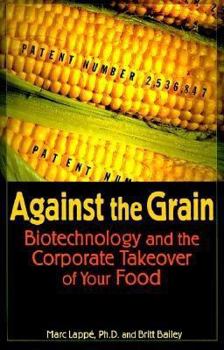Against the Grain: Biotechnology and the Corporate Takeover of Your Food
Select Format
Select Condition 
Book Overview
Takes a close & chilling look at what the biotech industry means for your health. This description may be from another edition of this product.
Format:Paperback
Language:English
ISBN:1567511503
ISBN13:9781567511505
Release Date:July 2002
Publisher:Common Courage Press
Length:175 Pages
Weight:0.55 lbs.
Dimensions:0.5" x 5.9" x 9.0"
Customer Reviews
3 ratings
debunks the GM myth
Published by Thriftbooks.com User , 24 years ago
In only 150 pages, "Against the Grain" debunks many of the myths surrounding biotechnology and the genetic engineering that is revolutionizing US (and world) agriculture.One of the myths which "Against the Grain" debunks is the claim that genetically engineered crops are aimed at feeding the hungry of the world. As "Against the Grain" quite lucidly points out, if genetically engineered crops were aimed at feeding the hungry of the world then companies like Monsanto would develop seeds with certain characteristics such as: the ability to grow in substandard soils; the ability for plants to produce more protein, with increased per-acre yield, without increasing the need for expensive machinery, chemicals, fertilizer or water; they would aim to favour small farms over large farms; seeds would be cheap and freely available without restrictive licensing; they would be for crops that feed people, not animals. None of the genetically engineered crops now available have any of these characteristics. In fact new genetically engineered seeds require high-quality soils, huge investment in machinery and an increased use of chemicals.As "Against the Garin" so adeptly illustrates, the genetic engineering revolution has nothing to do with feeding the world's hungry but everything to do with enriching a priviledged few.
Food for (serious) thought
Published by Thriftbooks.com User , 25 years ago
A readable introduction to the topic of agricultural biotechnology . . . The author rationally questions the benefits touted by the seed & chemical corporations leading this market. Lappe offers data to show that there's neither nutritional benefits nor yield increases as motivating factors in this enterprise. Seeds manufactured to be pest and/or insecticide resistant sound great, but the author discusses how there may be unforeseen complications. What should happen if crop pests mutate and develop a resistance to these "built-in" defense mechanisms? Will the neighboring farmer who doesn't use the altered seed lose his entire crop to pests instead of spreading out the damage? Will farmers douse our crops with more chemicals since the plant can withstand them? What about the farm downwind whose crops may not be resistant? Also at issue is the "homogenizing" of our seed supply. If problems arise, it might not be so easy to "de-alter" supplies. And, of course, there's the issue of corporate greed. Lappe argues that companies like Monsanto force farmers into brand-loyalty by making seeds that are engineered to respond best to certain chemicals, usually those sold by the same company selling the seed. (Shocker!) The theme of this book is simply that there are too many unstudied potential risks to the process.Case in point: A Cornell University study announces (just this week!) that altered corn has been poisoning Monarch butterfly larvae.
Excellent Book!
Published by Thriftbooks.com User , 26 years ago
Really interesting and well-written. Easy to understand, even for someone who is not a scientist. A real look at what companies like Monsanto are doing to the world's food supply.






